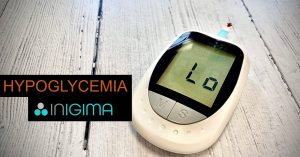Hypoglycemia:Symptoms Causes and Preventive Guidelines
When the level of glucose in your blood falls below what is healthy for you, you have low blood glucose, often known as low blood sugar or hypoglycemia. This entails a blood glucose level that is less than 70 milligrams per deciliter (mg/dL) for many diabetics. Find out what blood glucose level is low for you by speaking with your doctor or medical staff as your number may be different.

You’re more likely to get Hypoglycemia (low blood glucose) :
- Having type 1 diabetes
- 65-year-old or older
- Use insulin or a diabetic medication
- Has previously had low blood sugar
- Have additional health issues, like heart disease, kidney disease, or cognitive impairment
If your blood glucose level is low, you may feel
- Shaky Or Jittery
- Hungry
- Tired
- Dizzy, Lightheaded, Confused, Or Irritable
- Your Heart Is Beating Too Fast Or Not Steadily
- You Have A Headache
- You Can’t See Or Speak Clearly
Severe
If your blood glucose level is very low, your brain may stop working as it should. You may
- Lose consciousness
- Confusion
- Seizures
- Nightmares
- Fainting
- Coma
Severe hypoglycemia is dangerous and needs to be treated right away.
If your blood sugar is low, do not drive.
Driving should be avoided by those with low blood sugar levels since it could be hazardous. Before driving, people must wait for their blood alcohol levels to recover to normal.
People must safely stop their vehicles and check their blood sugar levels if they begin to suffer hypoglycemic symptoms while operating a motor vehicle.
If their blood sugar levels decrease while they are driving, people can find it beneficial to keep quick-acting carbs like orange juice or glucose pills in their car.
What problems might low blood sugar cause?
Low blood sugar that is mild to moderately severe is easily treatable. However, extremely low blood sugar levels can result in grave problems, such as fainting, coma, or even death.
Low blood sugar episodes that happen frequently can cause, anxiety or fear of low blood sugar and prevents you from taking the medications you need to manage your diabetes, you have high blood sugar levels. When you have hypoglycemia unawareness, your blood glucose level is so low that you don’t feel any symptoms of low blood sugar until it’s too late.
What results in low blood glucose levels in diabetics?
Insulin and other medications that aid in the release of insulin into the bloodstream may have the side effect of lowering blood glucose levels. You can lower your blood glucose level by taking these.
Your blood glucose level can be reduced by insulin and several other diabetic medications.
Sulfonylureas, usually taken once or twice per day, which increase insulin over several hours
Meglitinides, taken before meals to promote a short-term increase in insulin
The following could reduce your blood sugar levels:
Inadequate consumption of carbohydrates (carbs). Your digestive system converts the sugars and starches in carbohydrates-containing foods and drinks into glucose when you consume them. The subsequent entry of glucose into your bloodstream elevates your blood glucose level. Your blood glucose level may fall below what is healthy for you if you don’t consume enough carbohydrates or skip or delay any meals.
Fasting. Low blood glucose can also result from continuing to take medications that lower glucose levels while fasting for a procedure or for other reasons.
Raising the level of exercise. Your blood glucose level can be lowered by engaging in more physical activity than you usually do for up to 24 hours following the activity. Find out more about diabetes, diet, and exercise.
Excessive alcohol consumption without adequate nutrition Alcohol makes it more difficult for your body to maintain a constant blood glucose level, especially if you haven’t had any recent meals. Also, drinking alcohol can prevent you from experiencing low blood sugar’s initial signs, which can cause more serious problems.
Being ill When you’re unwell, you could find it difficult to keep food down or consume as much, which might reduce blood sugar.
Prevention
The underlying cause will determine how to prevent hypoglycemia. To prevent hypoglycemia, the underlying problem should be managed. People can take actions that may help.
Following a treatment plan: It’s critical to adhere to your doctor’s recommendations and get assistance if your symptoms worsen.
Blood glucose levels should be periodically checked by those at risk, who should also be aware of the symptoms.
Observing alcohol-related guidelines: maintaining the daily alcohol intake restrictions that a doctor advises, and refraining from drinking alcohol before to a meal.
Considering exercise: eating a snack high in carbohydrates before working out and being aware of how exercise can affect blood sugar levels.
Care for the sick: For instance, vomiting may stop the body from absorbing adequate energy.
Being prepared: Getting ready carrying a candy bar or a bottle of sweet fruit juice in case symptoms arise.
Informing others: Those who are prone to low blood sugar should let their acquaintances, coworkers, and family know.
Having INIGIMA Cloud Diagnosis medical ID will help emergency services, healthcare professionals, and others know what to do more quickly.
Key Points :
INIGIMA Digital Screening plays a very important role if you are suffering from multiple complications like diabetes, blood pressure, heart issues and obesity patient. It helps to maintain good health and helps to achieve a longer life. Book a session with an expert now
A review article by
Comments are closed